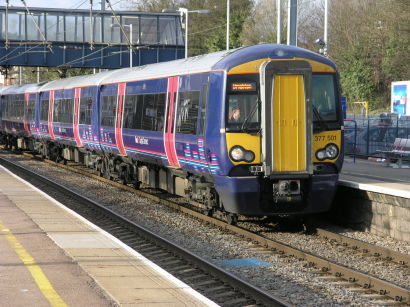SOUTHERN has launched a procurement process for more trains, after it became clear that the slipping Thameslink rolling stock programme means that 23 Class 377 units on sub-lease to First Capital Connect may not be returned on time.
The High Level Output Specification from the Department for Transport had assumed that the Class 377s would have been returned for the December 2013 timetable, but this now seems unlikely.
As a result, Southern is preparing to order 130 extra vehicles – enough for 32 four-car units – to fill the gap.
The operator has issued a PQQ (Pre-Qualification Questionnaire) to potential suppliers, with trains due for delivery no later than December 2013.
Southern Managing Director Chris Burchell said: "Without the return of our sub-leased vehicles we need to explore other options to provide the necessary capacity to meet our passengers’ needs.
"Critical to the success of this project will be the ability of suppliers to demonstrate they can deliver the trains on time while still offering affordability and value for money."
The 377s were originally delivered from Bombardier in Derby around two years ago, although some were delayed by problems caused by the 2009 financial crisis.
The head lease is held by Southern, but after commissioning trials at Selhurst depot the trains were all sent to Bedford for service with First Capital Connect, with the intention that the new Thameslink fleet would have made them redundant by 2013.
The problems with Thameslink rolling stock procurement are far from over. The government's timetable ran late, and when Siemens was finally named as preferred bidder in June a storm of protest arose, because of fears over the future of the Bombardier plant in Derby, which was the rival contender for the £1.4 billion order.
The DfT had hoped to confirm Siemens' status as supplier of the new Thameslink fleet in November, but this decision has now also slipped back, to early in 2012.
Meanwhile, the National Audit Office is preparing to publish a preliminary report on the DfT's procurement process, after it emerged that the wider economic benefits of placing the order in Derby were not taken into account.
There have been warnings that the loss of the Thameslink contract could have placed 20,000 British jobs at risk, both at Bombardier and in the wider supply chain.
If the NAO concludes that there were significant flaws in the Department's calculations, it will then mount a full inquiry.
Although the government is not bound by NAO conclusions, it seems unlikely that it can conclude the deal with Siemens deal unless the NAO signals that the process did offer, as is being claimed, best value for money for taxpayers.
Other challenges include a potential judicial review of the decision sponsored by UNITE the union, which has won the financial support of Derby City Council. A report on the procurement of rolling stock is also being prepared by the House of Commons Transport Committee, which took evidence from a number of witnesses earlier this month.


